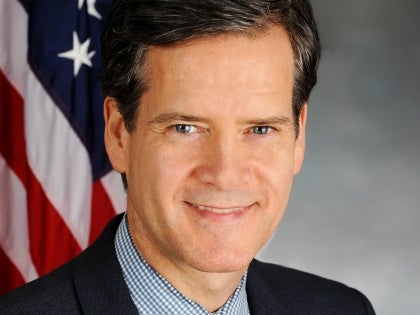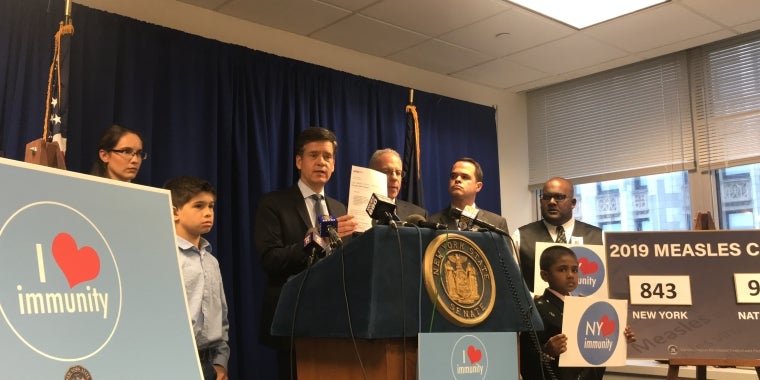
Gay City News: Cuomo Budget Doesn’t Solve AIDS Rent Cap Challenge
January 22, 2014 : By Paul Schindler
Despite a concerted drive in recent weeks by advocates and elected officials, Governor Andrew Cuomo’s Executive Budget for the fiscal year beginning April 1 does not include appropriation of funds to ensure that New Yorkers living with AIDS and receiving government rental assistance will have the effective rent they pay capped at 30 percent of their monthly income.
In a public policy battle, dating back at least seven years, to close what State Senator Brad Holyman characterized as a loophole in New York law, AIDS advocates had hoped Cuomo would step up with funding of at least $5.8 million during his annual budget address in Albany on January 21.
Hoylman, an out gay Chelsea Democrat who sponsors legislation to impose such a cap on the rental assistance program run out of the city’s HIV/ AIDS Services Administration (HASA) and similar units statewide, wrote to the governor last week laying out an analysis that showed that the roughly $20 million in incremental costs required to fund the rent cap would be offset nearly exactly by savings to the state and city from either curing rental arrears by housing assistance clients or providing them with emergency housing if they lose their apartments. More than 12,000 people with AIDS statewide receive rental assistance.
Depending on the state/ city funding formula applied to a rent cap appropriation, Albany would pick up between $5.8 million and $10 million of the total $20 million upfront cost, with the city providing the remainder.
The rental assistance provided to people living with AIDS currently requires them to pay up to 70 percent of their disability income toward rent and leaves them with only about $375 each month –– or less than $13 a day –– for all other expenses, a situation that forces many to choose between paying their rent and having money for food, transportation, and drug co-pays.
Hoylman’s letter emphasized that every other federal and state low-income rental assistance program –– including Section 8 and NYCHA housing –– has a 30 percent cap.
The issue has festered in Albany for years. In 2010, the Legislature sent the bill Hoylman now co-sponsors with East Harlem Democratic Assemblyman Robert Rodriguez to Governor David Paterson for his signature, but the lame duck Democrat, in the face of intense lobbying from former Mayor Michael Bloomberg, vetoed it. In 2012, the Republican-controlled Senate, which had once before approved the measure, defeated it, again at the behest of Bloomberg.
Hoylman’s letter to Cuomo, which he said was a follow-up to a conversation the two had at the Executive Mansion the day the governor delivered his State of the State speech, was just one part of the recent drive to elevate the visibility of the 30 percent rent cap issue. In an effort organized by VOCAL-NY, the grassroots housing advocacy group that has led the rent cap fight for years, more than 100 gay figures from organized labor and the entertainment and arts world joined Hoylman, Rodriguez, out gay Assemblyman Daniel O’Donnell, and City Councilmen Daniel Dromm, Corey Johnson, Carolos Menchaca, and Ritchie Torres, all of whom are gay as well, in a sign-on letter to the governor.
The list included American Federation of Teachers president Randi Weingarten, Stuart Appelbaum, who heads the Retail, Wholesale and Department Store Union, SEIU 1199 political director Kevin Finnegan, Empire State Pride Agenda executive director Nathan Schaefer, Bravo’s Andy Cohen, singer and actor Alan Cumming, playwright and actor Harvey Fierstein, playwright Terrence McNally, and actor and prominent de Blasio supporter Cynthia Nixon.
Now that Cuomo has passed up the chance to tackle the rent cap in his budget address, advocates are focused on three possibilities going forward. The first is the chance that the administration might yet incorporate funding into its 21-day budget amendments, a procedure typically used to make technical corrections to the governor’s initial outline. Hoylman pointed out that Cuomo’s January 21 address did not take account of the $81 million now available to the administration as part of the first phase of J.P. Morgan’s mortgage bond settlement with New York State. The settlement money is intended to address state housing needs, the senator noted.
Failing that, advocates will focus efforts between now and the end of June on pressing for legislative approval of the Hoylman-Rodriguez bill. Sean Barry, VOCAL-NY’s executive director, pointed out that a lopsided majority of the current State Senate has at some point in the past voted in favor of rent cap legislation. Though Majority Leader Dean Skelos, a Republican, voted against the measure in 2012 and did not allow a vote last year, Democrat Diane Savino, a Staten Island Democrat who caucuses with the Republicans as part the four-member Independent Democratic Conference, “has shown a strong interest in this,” Barry said.
Two critical factors Barry cited in voicing optimism about legislative action this year are the fact that New York now has a mayor, Bill de Blasio, who supports the concept and the possibility that Cuomo could also endorse the measure. Hoylman said, “The mayor has certainly made his opinion known to me and to other legislators,” and Barry emphasized, “We feel like we’re having productive conversations with the Cuomo administration.”
One other avenue that both Hoylman and Barry said could provide relief on the rent cap issue is the Medicaid Redesign Team (MRT), a state unit responsible for finding efficiencies in the state’s mammoth Medicaid system.
“It’s clear that this administration understands that AIDS housing is a health issue,” Barry said.
How an MRT solution might be structured, however, is less clear, since the unit is tasked primarily with finding savings in direct healthcare costs. The beauty of enacting a rent cap legislatively, Barry explained, is that the cost expenditures of subsidizing rents to cap them at 30 percent of income come from the same pot of money where the offsetting reductions in rental arrears and emergency housing costs would be realized.
Neither Cuomo’s office nor de Blasio’s responded to requests for comment on the rent cap issue.
